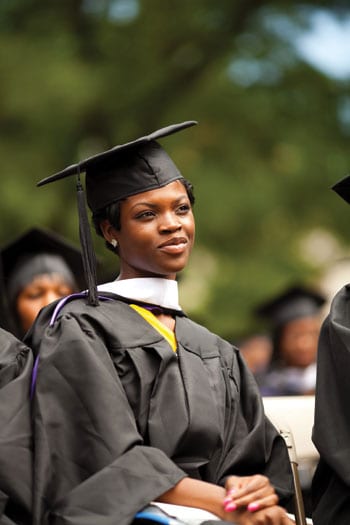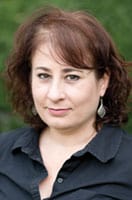Gone: A Reflection on the Morning after Graduation
Gone: A Reflection on the Morning after Graduation
by Wendy Bilen Thorbjornsen
I have always believed it is not so much their subjects that the great teachers teach as it is themselves.
-Frederick Buechner
 When I unlocked the back door this morning, I stood for a moment and surveyed the green tangle of vines overtaking the landscape. Looking up, I noticed a movement in the crook of a large tree. Then a familiar tail popped out, twitching and curling.
When I unlocked the back door this morning, I stood for a moment and surveyed the green tangle of vines overtaking the landscape. Looking up, I noticed a movement in the crook of a large tree. Then a familiar tail popped out, twitching and curling.
The young squirrel wriggled in and out of the greenery, turning somersaults, and climbed corkscrew up and down the same two branches. Was it building a nest? Marking territory? Simply playing?
I stepped away to make breakfast. The next time I peered outside, it was perched on the higher branch. Now it was the squirrel’s turn to watch me make breakfast. It stayed in place for several more minutes; we eyed each other as I sipped my smoothie.
The morning after
While I leaned against the doorframe watching this young squirrel, I considered all my former students who graduated yesterday, imagining them wandering sleepy-eyed into their own kitchens, fumbling for coffee, remembering that piece of embossed paper for which they had worked so hard and waited so long, now resting comfortably in their possession. Then I imagined them, ever so slightly, smiling.
I teach writing here in the District of Columbia at one of the country’s oldest and few remaining Catholic women’s colleges, now part of Trinity Washington University. Fulfilling and expanding on its original mission, Trinity actively seeks to provide opportunity to those who have often lacked access to a quality college education—or any college at all—because gender, money, social standing or skin color gets in the way.
Many praise the work that the tiny college is doing, for its rising enrollments and successful graduates, and for its increasing ability to reach a group of students that, even now, is overly stereotyped and underfunded, written off, ignored and shunned. The true heroines here, though, are the students, who often overcome tremendous barriers and fierce antagonism to defy, stretch and shatter those stereotypes and statistical probabilities in all of the above categories.
For many of these students, writing is labeled a undesirable gen-ed requirement, an irritating detour on the way to the real courses, something to get out of the way. Most of the young women who fill my classrooms come directly from high school. They don’t know what they don’t know. They would rather be somewhere else, doing something else with someone else.
Just 16 weeks
I have 16 weeks to prepare them before they go on to other courses and professors, to their majors and internships, to do what they really want.
That’s not a lot of time to cover and instill foundational skills in writing, thinking, reading, observing, questioning, analyzing and a hundred other topics, especially given the addition of the new stresses of college life to the existing stresses of their personal lives.
That’s not a lot of time to reverse the negativity in which the subject of writing, and their experience with it, has been drenched. Before these students can truly learn what I am trying to teach them, they have to see the need for it, and often they don’t—yet.
As do so many of my colleagues at Trinity and elsewhere, I take each look of apathy and statement of insecurity as a challenge to make writing approachable, attainable and most of all, relevant. Sometimes it works; sometimes it doesn’t; sometimes I have no idea.
I have taped this line by Frederick Buechner to my office computer: “I have always believed it is not so much their subjects that the great teachers teach as it is themselves.” At best, I am a blur in my students’ lives, the view out the car window as they speed to their destination.
Buechner reminds me that those 16 weeks are about far more than improving writing or spreading a love of learning.
That short time is about showing them that one more person believes in them and that they have what it takes to learn, grow, and flourish. In that sense, composition truly is a foundational skills course.
So, humbly, I do what I can in four months to persuade through logic, through love. Sometimes it works; sometimes it doesn’t; sometimes I have no idea.
Each time my students leave, they take a piece of me with them. Maybe someday that piece will congeal with pieces from other similar experiences, and these women will have what they need, not just to be good writers, but to be good people who know their own worth, who spend the rest of their lives valuing and building up the worth of others.
The grace in Buechner’s vision comes in the paradox: the more I give away, the fuller I become, and that allows me to live the whole process again, and again, and again. It reminds me that teaching is, more often than not, an act of faith.
After they leave my courses, I often see former students in the hallway, talking with their friends, calling out, “Hey, Professor T!” as they lope off to another class.
Sometimes they resurface in another course or return to my office for help with a paper or a letter of recommendation But generally when they go, they’re gone: on to other, better pursuits. If I have done my job, that’s exactly how it should be.
Graduation day
When all the elements of the college years forge together, I see them on that day in May, in their shimmering black gowns and new heels (or Chuck Taylors), walking across the platform as the provost calls their names. Sections of the crowd on the front lawn holler, hoot or clap.
The students, unadulterated joy stretched across their faces, hold up their arms in triumph and turn to their sisters, who know what that short walk means. I sit with the other faculty, looking down at the new graduates. They don’t see me; they see only that moment, the leather folio embossed with gold, the president’s outstretched hand. I cheer anyway; my robe cannot contain so much pride.
After the ceremony, the faculty lines the drive in front of Main Hall, and we applaud the new graduates as they recess. I find and embrace those I know, freely sharing praise and smiles, but then leave them to celebrate with their friends, their families, to go on with their lives. I return to my office, hang my gown and hood until next year, and go home.
Back in my kitchen, I remembered the squirrel. When I peeked outside, it had begun moving again. It jumped to a new branch and scampered away up into the trees.
 Wendy Bilen Thorbjornsen is an author and assistant professor of English at Trinity Washington University.
Wendy Bilen Thorbjornsen is an author and assistant professor of English at Trinity Washington University.
Reprinted with permission from the July 2012 issue of Women in Higher Education.